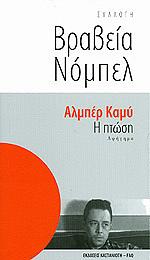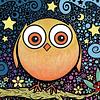Take a photo of a barcode or cover
იმ დროს, როდესაც რიგითი ანგელოზები "თბილისი ენერჯი"-ს ვესტიბიულში გაიჭედნენ, "თბილისელების" 2014 წლის ნომრით და "კიბოს კისრები"-თ სავსე ლარნაკთან ერთად - დაცემული ანგელოზები, ლოს-ანჯელესში მკვლელობებს იძიებენ და ფორტეპიანოებზე უკრავენ. საბოლოო ჯამში, მხატვრულ ჟურნალისტიკაზე თუკი თვალს დავხუჭათ (80%-20% - არც ისე ცუდი შეფარდებაა, მითუმეტეს თავად ჟურნალისტი ყოფილა) - მივიღებთ 4/5 ნაწილ ფილოსოფიას და 1/5 ნაწილ უსარგებლო ჩენჩოს. თუმცა, ჩენჩოსაც მოეძებნება თავისი გამოყენება, მითუმეტეს თუ მაღალ კალორიულია. რაც მთავარია, ყველაფერი ადვილად და მკვეთრად იმიჯნება და შეცდომით ვერაფერს გადაყრი ადამიანი სანაგვეზე.
გზა - ავგუსტინედან დოსტოევსკიმდე იმიტომ კი არ მთავრდება ჩიხით, რომ ჯერ დანტეზე გადის, არამედ იმიტომ, რომ დოსტოევსკი დგას წითელი აგურის კედელთან და, ქუჩის ეული ლამპის შუქის ქვეშ, ტალახში ეძებს დაკარგულ სიმშვიდეს. ეძებს იქ, სადაც არაფერი დაკარგულა, მაგრამ სამაგიეროდ არ ბნელა. საპიენსის გვარს ახასიათებს მსგავსი არარაციონალურობები, რაც თავისთავად პარადოქსალური შეიძლება მოგვეჩვენოს, თუ არ გავიხსენებთ იმას, რომ როგორც ყველანაირი მექანიზმი, ასევე თავის ტვინიც თავისი მარგი ქმედების კოეფიციენტით ხასიათდება და თერმოდინამიკის კანონებს ვერ დარღვევს.
კამიუს მთავარ მონაპოვრად შეიძლება ჩაითვალოს, დოსტოევშინის, მთლიანი და საბოლოო დამარცხება და განადგურება. რაც, იმთავითვე ძალიან მისასალმებელია, იმის გათვალისწინებით თუ რამდენად დიდ ავტორიტეტად მიიჩნევა დოსტოევსკი და როგორი ფანატიკური პოპულარობით სარგებლობს მისი ნააზრევი. კამიუს ტექსტის სტრუქტურული და სტილისტური მსგავსებაც, იგივე "ჩანაწერებთან" - შემთხვევითი არ უნდა იყოს და ანტი-დოსტოევშჩინას უსვამს ხაზს. დიდი გამბედაობაა საჭირო იმისათვის, რომ, ჯერ თავდაყირა დააყენო დიდი ავტორიტეტის მოსაზრებები, ხოლო შემდეგ კი აჩვენო მისი დაავადებული ტვინიც და ამ დაავადების პირველწყაროც. ჩემთვის კი, როგორც იმ მკითხველისთვის, რომელსაც ყელში ამოუვიდა, ყოველ კუთხე-კუნჭულში დოსტოევსკის ნაწარმოების ოხვრა- კვნესითი ქება-დიდება, ძალიან სასიამოვნო იყო კამიუს, ცოტათი ჟურნალისტური და ცოტაც ცინიკური ხელი.
თავად ტექსტი, უფრო ზუსტი ანალიზისთვის, საჭიროებს განმეორებით წაკითხვებს. მანამდე კი, არავინ არსად არ ჩაცემულა და ზეცაშიც სრული სიცარიელე სუფევს.
P.S საბერძნეთის გაწმინდანებაზე კიდევ, ცალკე შეიძლებოდა ვარსკვლავების დაკლება.
გზა - ავგუსტინედან დოსტოევსკიმდე იმიტომ კი არ მთავრდება ჩიხით, რომ ჯერ დანტეზე გადის, არამედ იმიტომ, რომ დოსტოევსკი დგას წითელი აგურის კედელთან და, ქუჩის ეული ლამპის შუქის ქვეშ, ტალახში ეძებს დაკარგულ სიმშვიდეს. ეძებს იქ, სადაც არაფერი დაკარგულა, მაგრამ სამაგიეროდ არ ბნელა. საპიენსის გვარს ახასიათებს მსგავსი არარაციონალურობები, რაც თავისთავად პარადოქსალური შეიძლება მოგვეჩვენოს, თუ არ გავიხსენებთ იმას, რომ როგორც ყველანაირი მექანიზმი, ასევე თავის ტვინიც თავისი მარგი ქმედების კოეფიციენტით ხასიათდება და თერმოდინამიკის კანონებს ვერ დარღვევს.
კამიუს მთავარ მონაპოვრად შეიძლება ჩაითვალოს, დოსტოევშინის, მთლიანი და საბოლოო დამარცხება და განადგურება. რაც, იმთავითვე ძალიან მისასალმებელია, იმის გათვალისწინებით თუ რამდენად დიდ ავტორიტეტად მიიჩნევა დოსტოევსკი და როგორი ფანატიკური პოპულარობით სარგებლობს მისი ნააზრევი. კამიუს ტექსტის სტრუქტურული და სტილისტური მსგავსებაც, იგივე "ჩანაწერებთან" - შემთხვევითი არ უნდა იყოს და ანტი-დოსტოევშჩინას უსვამს ხაზს. დიდი გამბედაობაა საჭირო იმისათვის, რომ, ჯერ თავდაყირა დააყენო დიდი ავტორიტეტის მოსაზრებები, ხოლო შემდეგ კი აჩვენო მისი დაავადებული ტვინიც და ამ დაავადების პირველწყაროც. ჩემთვის კი, როგორც იმ მკითხველისთვის, რომელსაც ყელში ამოუვიდა, ყოველ კუთხე-კუნჭულში დოსტოევსკის ნაწარმოების ოხვრა- კვნესითი ქება-დიდება, ძალიან სასიამოვნო იყო კამიუს, ცოტათი ჟურნალისტური და ცოტაც ცინიკური ხელი.
თავად ტექსტი, უფრო ზუსტი ანალიზისთვის, საჭიროებს განმეორებით წაკითხვებს. მანამდე კი, არავინ არსად არ ჩაცემულა და ზეცაშიც სრული სიცარიელე სუფევს.
P.S საბერძნეთის გაწმინდანებაზე კიდევ, ცალკე შეიძლებოდა ვარსკვლავების დაკლება.
"I like people who dream or talk to themselves interminably; I like them, for they are double. They are here and elsewhere."
سارتر میگه که این اثر زیباترین و درکناشدهترین کتاب آلبر کامو هست. راست هم میگه.
داشتم کتاب رو ترجمه میخوندم و بعد از ۳۵ صفحه گذاشتمش کنار. بعد رفتم یه نسخهی انگلیسی ازش پیدا کردم و شروع کردم به خوندنش و دیگه نتونتسم بذارمش زمین:) احساس میکنم این کتاب کامو از مدل کتابهاست که باید چندبار بخونی و بعد از هر بار خوندن، بیشتر و بیشتر عاشقش میشی.
سارتر میگه که این اثر زیباترین و درکناشدهترین کتاب آلبر کامو هست. راست هم میگه.
داشتم کتاب رو ترجمه میخوندم و بعد از ۳۵ صفحه گذاشتمش کنار. بعد رفتم یه نسخهی انگلیسی ازش پیدا کردم و شروع کردم به خوندنش و دیگه نتونتسم بذارمش زمین:) احساس میکنم این کتاب کامو از مدل کتابهاست که باید چندبار بخونی و بعد از هر بار خوندن، بیشتر و بیشتر عاشقش میشی.
challenging
reflective
slow-paced
Plot or Character Driven:
Character
Strong character development:
Complicated
Loveable characters:
No
Diverse cast of characters:
No
Flaws of characters a main focus:
Yes
The most astonishingly original opinion on the human condition. Albert Camus' "The Fall" is a dissection of life and the nature of the human beings that live it. It is the best thing any writer can ever want to have with him forever. More important than a thesaurus, this will book will explain everything and anything to anybody seeking answers about themselves and those who surround them. One of the most important texts on life, this side of Ovid's Metamorphoses and can definitely breathe the same air as Ernest Hemingway's 'Old Man and The Sea" and Charles Dickens' "A Tale Of Two Cities".
A promising work. The first half is camus at his strongest. His description of the "upstanding avocat" is reminiscent of the "Lovers" prefaces in The Peste (the strongest sections in that work), and contains the promise of subtle insight to follow. Unfortunately camus doesn't make good on this.
The self-description of the soi-disant "virtuous person" already contains some not-so-subtle hints of its collapse (most prominent in association with the narrators adoration for Height: being at the top, looking down, etc. - such imagery isn't difficult to parse) and this is fine. From there it would be sufficient to develop these flaws and thereby follow to the end the trajectory of such an above-average person - an idea for a passable work. Had he more courage, camus would have instead given him an "abnormal psychology" which, perfect in its virtue, anticipates its own demise and rejects it, finally succumbing to a clever dialectical turn in which the virtuous narrator approximates himself to a higher categorial virtue and annihilates himself (a kind of "Johannes de Silentio" figure - though dealing with "Judge William"-type questions). Camus has patience for neither of these approaches.
Quite simply, he has the narrator enter "existential" proximity with "the truth", after which he immediately becomes the insecure, idealistic, strangely young character who is the precise self-image of the "disillusioned" (and almost invariably male) lycée readers who have come to admire this author so very much. From there we get a few tiresome ideas such as:
"I learned what life is really like and realized I was a hypocrite to be held in such high esteem, and so I began acting out precisely to fall in these graces and become who I really am." (this is what teens like to imagine they are doing when they act out)
"Once I realized other people could judge me I lost the assurance of my character and became insecure" (coincidentally the teenager is also just discovering that other people have thoughts too)
"As a 'judge-penitant' I am actually the most clever person in the room because, with my dialectical approach, I am able to convince my interlocutor to divulge their deepest inadequacies while, really, I risk nothing. They are affected, but I am right and shall never change." (this one speaks for itself)
That said, the prose, even in translation, is not bad, and the work also has the virtue of brevity - take note.
The self-description of the soi-disant "virtuous person" already contains some not-so-subtle hints of its collapse (most prominent in association with the narrators adoration for Height: being at the top, looking down, etc. - such imagery isn't difficult to parse) and this is fine. From there it would be sufficient to develop these flaws and thereby follow to the end the trajectory of such an above-average person - an idea for a passable work. Had he more courage, camus would have instead given him an "abnormal psychology" which, perfect in its virtue, anticipates its own demise and rejects it, finally succumbing to a clever dialectical turn in which the virtuous narrator approximates himself to a higher categorial virtue and annihilates himself (a kind of "Johannes de Silentio" figure - though dealing with "Judge William"-type questions). Camus has patience for neither of these approaches.
Quite simply, he has the narrator enter "existential" proximity with "the truth", after which he immediately becomes the insecure, idealistic, strangely young character who is the precise self-image of the "disillusioned" (and almost invariably male) lycée readers who have come to admire this author so very much. From there we get a few tiresome ideas such as:
"I learned what life is really like and realized I was a hypocrite to be held in such high esteem, and so I began acting out precisely to fall in these graces and become who I really am." (this is what teens like to imagine they are doing when they act out)
"Once I realized other people could judge me I lost the assurance of my character and became insecure" (coincidentally the teenager is also just discovering that other people have thoughts too)
"As a 'judge-penitant' I am actually the most clever person in the room because, with my dialectical approach, I am able to convince my interlocutor to divulge their deepest inadequacies while, really, I risk nothing. They are affected, but I am right and shall never change." (this one speaks for itself)
That said, the prose, even in translation, is not bad, and the work also has the virtue of brevity - take note.
challenging
reflective
slow-paced
Plot or Character Driven:
Character
Strong character development:
No
Loveable characters:
Complicated
Diverse cast of characters:
No
Flaws of characters a main focus:
Yes
I can tell there is incredible wisdom in this novel regarding the human condition and existential laws. However, it was not the most enjoyable read. Nonetheless, I still love camus and respect his wisdom, it was just not very digestible for me particularly.
funny
reflective
medium-paced
Plot or Character Driven:
Character
Strong character development:
Complicated
Loveable characters:
No
Diverse cast of characters:
No
Flaws of characters a main focus:
Yes
dark
fast-paced
Plot or Character Driven:
Character
Strong character development:
Yes
Loveable characters:
No
Diverse cast of characters:
No
Flaws of characters a main focus:
Yes
Camus is brilliant and this story is everything I was looking for.





